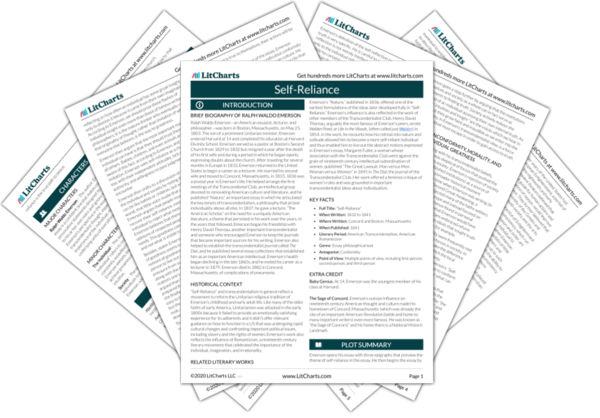Emerson and other transcendentalists believed that nature—rather than society, institutions, or the Church—is the ultimate source of truth about the self, God, and existence. As Emerson put it in another essay he wrote, “The Foregoing generations beheld God and Nature face to face; we—through their eyes. Why should not we also enjoy an original relation to the universe.” In this quote, Emerson is saying that, while previous generations connected directly to God and Nature, the modern generation connects to those things only through the institutional leavings of the previous generation. Emerson advocates not settling for such an indirect connection, and he argues that actually engaging with nature offers the means of gaining that direct connection to existence, and, as a consequence, a deeper understanding of the self and self-reliance.
Emerson believes that “the sense of being which in calm hours rises, we know not how, in the soul, is not diverse from things, from space, from light, from time, from man, but one with them, and proceeds obviously from the same source whence their life and being also proceed.” In this passage Emerson makes the case for that unity of things, and describes the way that people can experience those “calm hours” of nature in which they then experience unity.
But Emerson sees nature as a great teacher in a different way as well. He sees nature as providing the ultimate example of what it means to be self-reliant. As Emerson describes it, people should relate to the rest of existence in the way that “blade of grass or the blowing rose” do—there is “no time to them” and they “exist with God to-day,” without dwelling on the past. However, Emerson continues: “man postpones or remembers; he does not live in the present, but with reverted eye laments the past, or, heedless of the riches that surround him, stands on tiptoe to foresee the future.” Further, Emerson states, the individual “cannot be happy and strong until he too lives with nature in the present, above time.”
Emerson’s argument here underlies his view about the falseness of the concept of “progress,” which involves a measuring against the past and future, rather than an engagement with the present. Emerson argues that God and existence happen solely in the present, and that only in nature can the individual see the present in its “richness.” The self-reliant individual, though, attuned to nature and his (or her) inner self, is connected to the present, and therefore to the unity of everything. Emerson sees nature also as offering a more practical model of self-sufficiency. “Power,” he states, “is in nature the essential measure of right. Nature suffers nothing to remain in her kingdoms which cannot help itself.” Nature therefore offers a “demonstration of the self-sufficing, and therefore self-relying soul.”
Emerson, of course, is also interested in human nature. But he argues that society—with its pressures to conform and to respect only what society itself teaches rather than what a person actually intrinsically thinks or feels—actually takes people out of their own nature. Emerson then argues that it is possible to find examples of a self-reliant human nature by paying attention to people that are closer to nature. Emerson sees babies and children as perfect examples of human nature in touch with itself. He calls them "pretty oracles nature yields" because they have not yet internalized societal expectations and habits of thoughts that lead them to devalue emotion and their own intuition. Celebrating the wilfullness of children, Emerson playfully remarks that "[i]nfancy conforms to nobody: all conform to it, so that one babe commonly makes four or five out of the adults who prattle and play to it."
Emerson extends his example to boyhood by remarking that the "nonchalance of boys who are sure of a dinner, and would disdain as much as a lord to do or say aught to conciliate one, is the healthy attitude of human nature." Like a baby, Emerson says, a boy is "independent, irresponsible, looking out from his corner on such people and facts as pass by, he tries and sentences them on their merits, in the swift, summary way of boys, as good, bad, interesting, silly, eloquent, troublesome. He cumbers himself never about consequences, about interests: he gives an independent, genuine verdict." Emerson adds that a grown man in the grip of societal expectations, on the other hand is "clapped into jail by his consciousness."
Emerson’s ideas about the individual, then, are closely connected to his ideas about nature. Emerson’s self-sufficient individual, in fact, is someone who is connected to and displays the same sorts of traits as nature itself. Further, Emerson argues that, despite the pressure to conform to society, all people (even the most conformist) still display some measure of self-reliance. As Emerson states, “no man can violate his nature.” In other words, he is saying that while conforming to societal expectations can warp or obscure a person’s natural self-reliance, it can’t eliminate it entirely. And, if people exercise that self-reliance, Emerson believes it will bring them back into their original connection to nature. As puts it, if individuals acknowledge that underlying nature, all of their actions will be “honest and natural in their hour.”
Nature ThemeTracker

Nature Quotes in Self-Reliance
A foolish consistency is the hobgoblin of little minds, adored by little statesmen and philosophers and divines. With consistency a great soul has simply nothing to do.

Unlock explanations and citation info for this and every other Self-Reliance quote.
Plus so much more...
Get LitCharts A+








